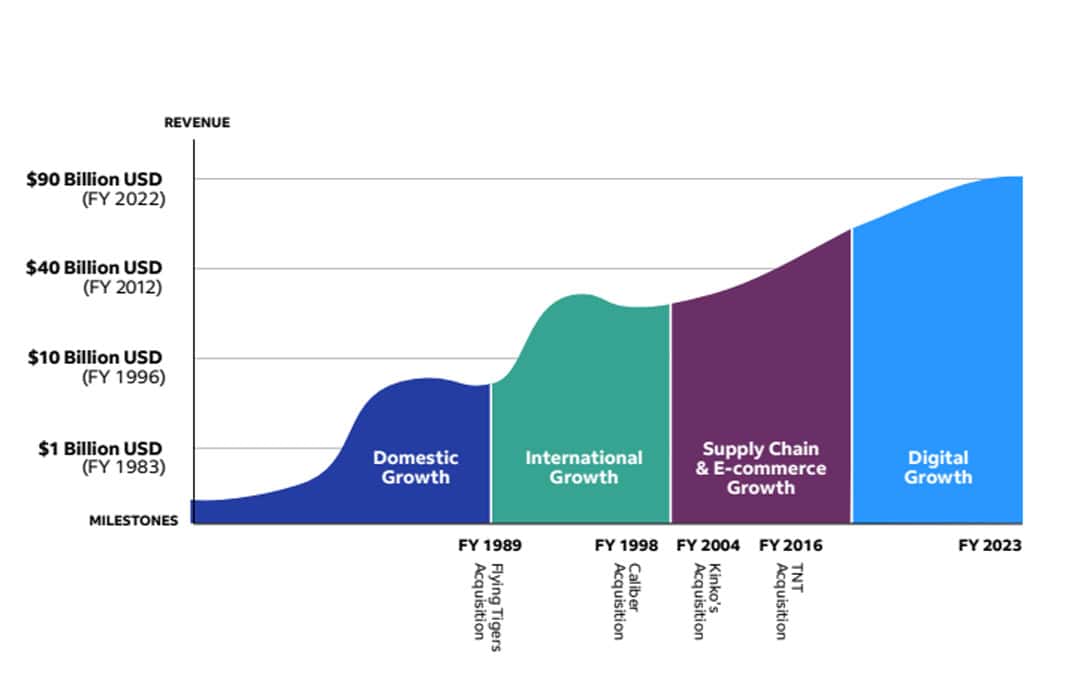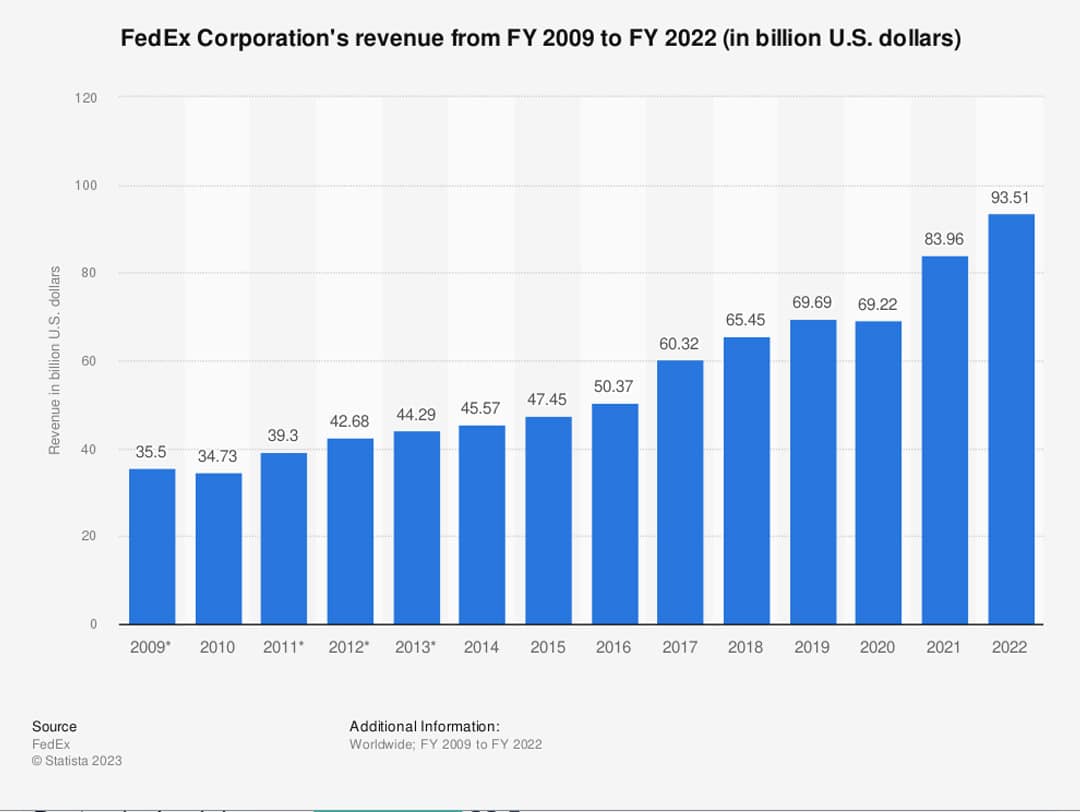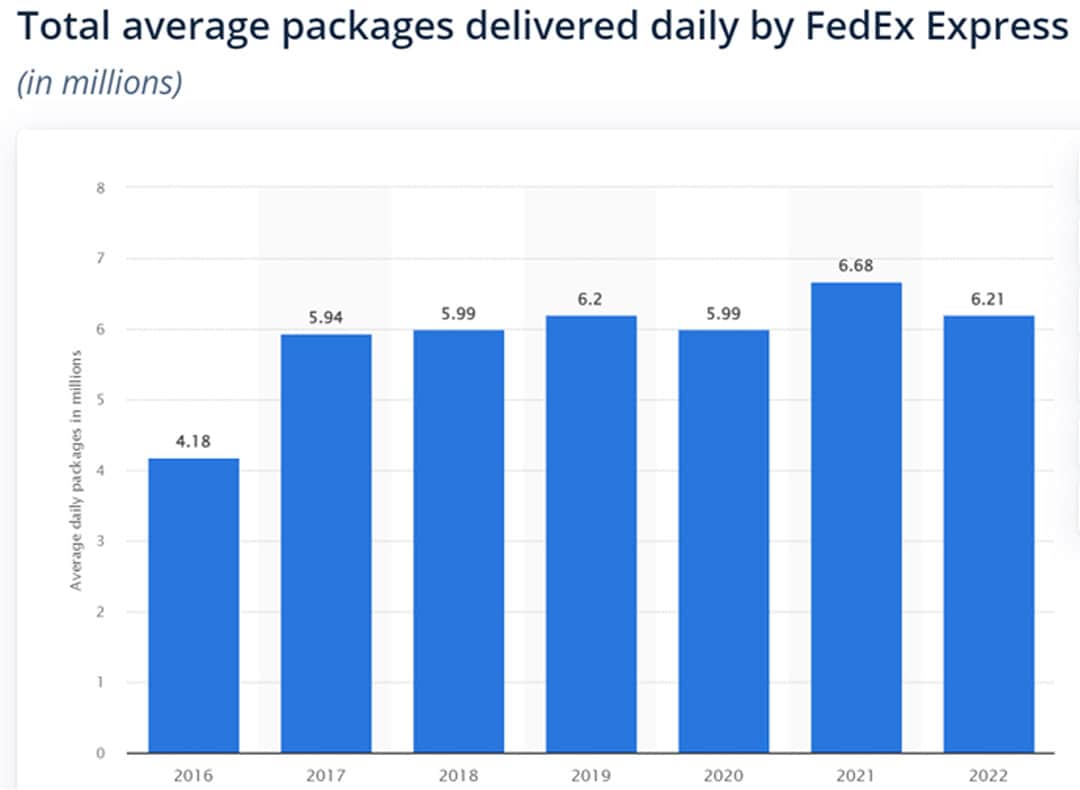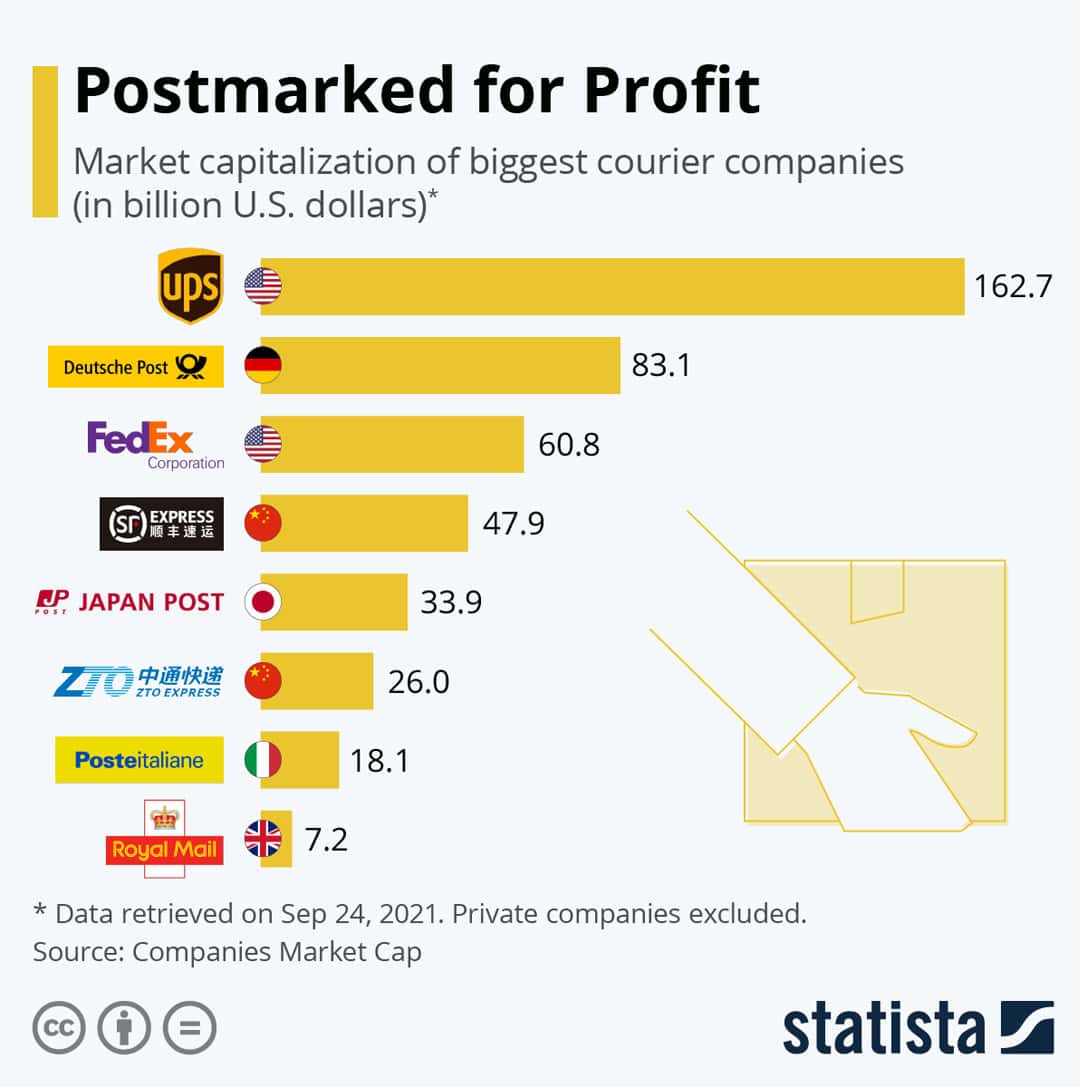The fiscal year 2023 marked a transition period for the economy and FedEx. Inflation, interest rates, and the global trade deceleration led to a general weakening of the industrial economy. Additionally, consumer spending shifted towards services rather than goods, and there was a resurgent of e-commerce following the COVID-19 pandemic. In response, FedEx quickly implemented actions to align its cost base with underlying demand and build the most flexible, efficient, and intelligent network, as demonstrated by the company in its latest Economic Impact Report.
FedEx connects to more than 220 countries and territories with various transportation, logistics, and business services. FedEx shipping options, customs brokerage services, supply chain management tools, and other services support businesses of all sizes in generating economic growth worldwide, creating an impact in the local communities where FedEx and its clients operate, as well as in the economies of entire countries and geographic regions.

Its latest report quantifies the company’s economic impact using Dun & Bradstreet analysis of FedEx’s contributions to the global economy and its four central operating regions: the United States; the Americas (Canada and Latin America and the Caribbean); Europe; and AMEA (Asia Pacific, Middle East, and Africa).
Fedex’s Economic Impact Report details the company’s impact on regional net economic product through its commercial services, capital investments, employment, and spending with local suppliers. Each regional focus also includes a closer look at selected markets, highlighting the positive role FedEx plays in areas where the company has a significant presence, and these are the most relevant data for Latin America and the Caribbean.
FedEx in LatAm
Since FedEx started its first international shipments to Canada in 1981, it has expanded its presence throughout North and South America and the Latin America and the Caribbean (LAC) region in the following decades. FedEx Express serves more than 50 countries and territories on the continent, with a network extending to the southern tip of America. The FedEx Express gateway at Miami International Airport, Florida, serves as the central connection point for LatAm markets.
Thanks to an expansion of that location in fiscal year 2022, which included additional sorting capacity, a new cold chain facility, and a new customs clearance area to accelerate international shipments by reducing customs clearance times, these markets now have even more connectivity with communities within the region. These improvements and accelerated transit times are critical, especially when shipping perishable products. For example, Colombia is the largest supplier of fresh flowers to the U.S., and farmers rely on FedEx to reach 99% of destinations in the U.S. in less than three days from when the flowers are cut.
FedEx Express continued to invest in the region in fiscal year 2023 to improve service and support economic activity, including improvements to the FedEx Express distribution center in Pudahuel, Santiago, Chile. With this presence, FedEx has a significant direct impact on the regional economy.

In fiscal year 2023, FedEx’s operations in the Americas (including the company’s operations in the U.S.) contributed 2.1% to the net economic product in the Transportation, Storage, and Communications sector. Additionally, FedEx indirectly contributed an additional USD $13 billion to the net financial product in North and South America in fiscal year 2023. FedEx also had a significant indirect impact on other critical sectors in LatAm, such as Manufacturing. In fiscal year 2023, FedEx indirectly contributed an estimated USD $1.8 billion to the manufacturing sector.
Brazil: a strategic partner in economic growth
Brazil, the largest economy in South America and the seventh largest in the world has been a strategic partner for FedEx since it began its services in the country in 1989. The acquisition of Rapidão Cometa in 2012 and the global integration of the TNT network in 2016 further expanded FedEx’s presence in Brazil. Currently, FedEx employs approximately 11,000 team members throughout Brazil. The FedEx network includes a gateway that offers five international flights per week and nine domestic distribution centers connecting to over 5,300 locations in Brazil and providing road access to four other South American countries.
FedEx’s growing presence in Brazil is not limited to its logistical impact; it is also committed to strengthening support for local communities through charitable donations and volunteer efforts. A notable example is FedEx’s uniform recycling program, which has benefited about 60 institutions and approximately 16,000 people since its inception.
In fiscal year 2023, FedEx Express recycled around 1.5 tons of old uniforms, transforming them into 5,500 blankets donated to institutions supporting vulnerable individuals and animal protection services during the winter.

Chile: innovation and sustainability for growth
FedEx began operations in Chile 30 years ago and operates the country’s largest national delivery network. With services covering more than 400 communities along over 500 operational routes, FedEx Express connects businesses and customers throughout the country and the rest of the world through five international flights per week. In recent years, FedEx Express in Chile has invested in its facilities, introduced state-of-the-art equipment, and modified the configuration of its fleet to meet sustainability goals and provide better service to small and medium-sized businesses that have experienced rapid growth in online sales.
In fiscal year 2023, FedEx Express expanded its distribution center in Pudahuel, Santiago, from 7,600 square meters to 14,000 square meters. The installation of advanced sorting equipment has allowed the facility to process 6,000 packages per hour, doubling its original capacity. Simultaneous loading efficiency of packages onto vehicles increased by over 30%. These improvements reduce processing time and expedite pickup and delivery services for South America’s largest e-commerce-centric distribution center.
During the expansion of the Pudahuel distribution center, FedEx Express also installed electric vehicle charging infrastructure to support the company’s goal of achieving carbon-neutral operations by 2040. FedEx Express also transformed its fleet in Chile to meet the needs of smaller businesses better focused on e-commerce. The number of vans in the fleet grew from 235 in 2020 to 327 in the 2023 calendar year, an increase of nearly 40%.
Vans now represent 35% of the total vehicle fleet in Chile used for handling small packages. At the same time, FedEx Express continued improving the efficiency of its larger trucks. In early 2023, FedEx Express in Chile introduced its first trucks with engines that comply with EPA2010 GHG21 standards, surpassing Chile’s existing environmental standards for heavy-duty engines.
The company also implemented comprehensive driver training and projects related to the use of wide tires and improvements in engine power configuration. With these efforts, FedEx Express achieved a 5.8% improvement in the energy efficiency of its fleet of 97 tractor-trucks and 154 trailers making daily trips on Chile’s roads, reducing CO2 emissions by 291 tons during the fiscal year. These efforts helped FedEx Express’s land operations in Chile achieve the Clean Turn certification for the fourth consecutive year.
Clean Turn, an initiative by Chile’s Energy Sustainability Agency, recognizes companies for improving the environmental impact of their operations with ongoing initiatives in fuel, engine oil, and tires to reduce greenhouse gas emissions and fuel consumption about cargo transported and the number of kilometers traveled.

In conclusion, despite a challenging operating environment in fiscal year 2023, FedEx continued to make substantial contributions to the economy of LatAm, where it plays a crucial role in facilitating the flow of goods, services, and information. FedEx’s transportation, e-commerce, and business services connect the vast majority of the world’s gross domestic product (GDP), so the company contributes to economic growth through its investments in facilities, employee salaries, and purchases with local suppliers throughout Latin America.






